英语五大基本句型练习
五种基本句型(含练习及答案)
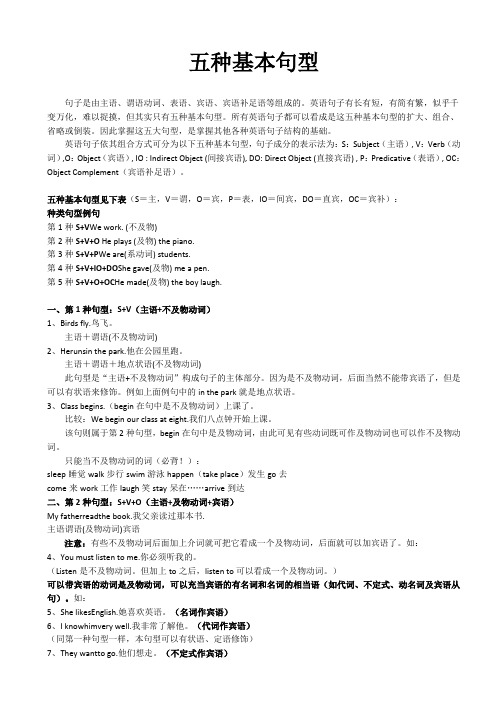
五种基本句型句子是由主语、谓语动词、表语、宾语、宾语补足语等组成的。
英语句子有长有短,有简有繁,似乎千变万化,难以捉摸,但其实只有五种基本句型。
所有英语句子都可以看成是这五种基本句型的扩大、组合、省略或倒装。
因此掌握这五大句型,是掌握其他各种英语句子结构的基础。
英语句子依其组合方式可分为以下五种基本句型,句子成分的表示法为:S:Subject(主语), V:Verb(动词),O:Object(宾语), IO : Indirect Object (间接宾语), DO: Direct Object (直接宾语) , P:Predicative(表语), OC:Object Complement(宾语补足语)。
五种基本句型见下表(S=主,V=谓,O=宾,P=表,IO=间宾,DO=直宾,OC=宾补):种类句型例句第1种S+V We work. (不及物)第2种S+V+O He plays (及物) the piano.第3种S+V+P We are(系动词) students.第4种S+V+IO+DO She gave(及物) me a pen.第5种S+V+O+OC He made(及物) the boy laugh.一、第1种句型:S+V(主语+不及物动词)1、Birds fly.鸟飞。
主语+谓语(不及物动词)2、Herunsin the park.他在公园里跑。
主语+谓语+地点状语(不及物动词)此句型是“主语+不及物动词”构成句子的主体部分。
因为是不及物动词,后面当然不能带宾语了,但是可以有状语来修饰。
例如上面例句中的in the park就是地点状语。
3、Class begins.(begin在句中是不及物动词)上课了。
比较:We begin our class at eight.我们八点钟开始上课。
该句则属于第2种句型,begin在句中是及物动词,由此可见有些动词既可作及物动词也可以作不及物动词。
高二英语-五种基本句型

基本句型(3)
主谓宾结构(一) 此结构是由主语+谓语+宾语构成
( S. + V. + O. )
其中的谓语动词须是及物的动词或及物的 动词词组 宾语须是名词或相当于名词的成分
带 V-ing 做宾语的动词有:
suggest, advise, stop, resist, enjoy, imagine,finish, escape, admit, excuse, delay, practise, consider, keep, mind, understand, avoid, miss, risk succeed in, be busy,be worth, be used to, give up, look forward to
带 to do 做宾语的动词有:
offer, learn, intend, plan, demand, ask, promise, help,prepare,decide, determine,refuse, dare,manage,wish, hope, want, expect, fail,pretend, choose, seem, expect, hope, offer, agree, refuse, learn, help, plan, intend, etc.
They have carried out the plan successfully.
5.你们必须在两周内看完这些书。
You must finish reading these books in two weeks.
6.那位先生能流利地说三种语言。
That gentlemen can speak three languages fluently.
五大基本句型的翻译练习(经典)

五大基本句型的翻译练习五种句型的动词比较复杂,因此我们将每种句型进行分类。
并编写了大量练习,希望在做练习前能仔细地阅读例题(1~5题),然后再做练习(6~10题)。
只要能坚持做完,完成书面表达的要求是轻而易举的。
句型Ⅰ(S+V+P 主+系动词+表)No 1.主语+be +名词(1)All these dictionaries are a great help to me. 所有这些字典都对我帮助很大。
(2)Mr Green may be an American. 格林先生可能是美国人。
(3)Mr Smith was once a teacher of English. 史密斯先生曾经当过英语教师。
(4)This is No time for you to do that. 这可不是你做那事的时候。
(5)He's No fool. 他可一点也不傻。
(6)失败为成功之母。
(7)我的孩子们对我是很大的安慰。
(8)这一定是个语法上的错误。
(9)这可不是什么开玩笑。
(10)他哪里算得上是我的朋友。
No 2.主语+be +各种代词(1)This is too much. 这太多了(这太过分了)。
(2)It's something quite unusual. 事情很不寻常。
(3)Who is that man over there? 那边那个人是谁?(4)How many are you altogether? 你们一共有多少人?(5)What is he? 他是做什么的?(6)那本书是我的。
(7)事情好像是这样。
(8)这是谁的自行车?(9)今天苹果是什么价?(10)您好!No 3.主语+be +形容词+介词短语(1)The weather was fine all the way through. 一路上天气都很好。
(2)China is rich in natural resources.中国自然资源丰富。
高中英语英语五种基本句型及练习
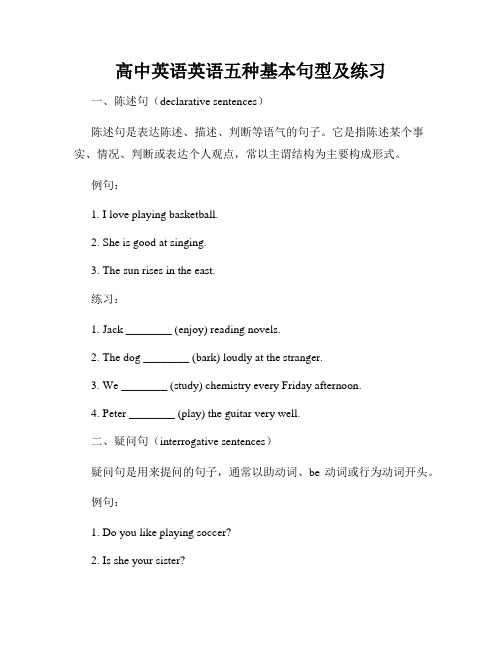
高中英语英语五种基本句型及练习一、陈述句(declarative sentences)陈述句是表达陈述、描述、判断等语气的句子。
它是指陈述某个事实、情况、判断或表达个人观点,常以主谓结构为主要构成形式。
例句:1. I love playing basketball.2. She is good at singing.3. The sun rises in the east.练习:1. Jack ________ (enjoy) reading novels.2. The dog ________ (bark) loudly at the stranger.3. We ________ (study) chemistry every Friday afternoon.4. Peter ________ (play) the guitar very well.二、疑问句(interrogative sentences)疑问句是用来提问的句子,通常以助动词、be动词或行为动词开头。
例句:1. Do you like playing soccer?2. Is she your sister?3. Where is the nearest supermarket?练习:1. ________ you watch TV last night?2. ________ the weather like today?3. ________ Tim have a new car?三、祈使句(imperative sentences)祈使句是用来表达命令、请求、建议等意思的句子。
它通常以动词原形开头。
例句:1. Please close the door.2. Study hard for the exam.3. Let's go for a walk.练习:1. ________ your homework before going to bed.2. ________ your parents for permission before going out.3. ________ up early tomorrow.四、感叹句(exclamatory sentences)感叹句用来表达强烈的感情、惊奇、赞美、喜悦等。
英语五大基本句型练习

英语五大基本句型练习1. Declarative Sentences (陈述句)- The sun rises in the east and sets in the west. (太阳从东方升起,西方落下。
)- She has completed her homework before dinner. (她在晚饭前完成了作业。
)2. Interrogative Sentences (疑问句)- Can you tell me the way to the library? (你能告诉我去图书馆的路吗?)- What time does the store open in the morning? (商店早上几点开门?)3. Imperative Sentences (命令句)- Please close the door gently. (请轻声关门。
)- Do not forget to turn off the lights when you leave. (离开时别忘了关灯。
)4. Exclamatory Sentences (感叹句)- How beautiful the flowers are! (这些花多美啊!)- What a wonderful day it is! (多么美好的一天啊!)5. Interrogative Sentences with Embedded Questions (含有疑问句的陈述句)- I wonder if it will rain tomorrow. (我想知道明天是否会下雨。
)- She asked where the nearest bus stop was. (她问最近的公交车站在哪里。
)。
英语五大基本句型及相应例句

英语五大基本句型及相应例句一、主语 + 谓语1.The cat sleeps.2.She sings beautifully.3.They play football every day.4.He reads books in the library.5.We study English together.二、主语 + 谓语 + 宾语1.Tom eats an apple.2.She writes a letter to her friend.3.They watch a movie on weekends.4.I play the guitar at the party.5.We visit the museum on Sundays.三、主语 + 谓语 + 宾语 + 宾语补语1.She painted the wall blue.2.He considers the book interesting.3.They elected her class president.4.The teacher found his answer correct.5.We named our new puppy Rocky.四、主语 + 谓语 + 地点状语1.She works in a hospital.2.We had lunch at the restaurant.3.They play basketball in the gym.4.He reads books in the park.5.I study English at home.五、主语 + 谓语 + 时间状语1.She wakes up early in the morning.2.They have dinner at 7 p.m.3.He goes to bed late at night.4.We go swimming on Saturdays.5.I visit my grandmother every Sunday.通过以上例句的展示,你可以更好地理解英语中的五大基本句型,希望对你的学习有所帮助。
英语五大基本句型详解与练习(配答案)

从英语的句子结构上说,除了修饰名词的定语和修饰动词的状语外,在千变万化的句子中可归纳为五个基本句式,一般地说,某些动词在某一句式中,下面我们把这些句型和常用的动词进行归类,供大家参考。
一、S(主) + Vi (不及物动词) (谓)Time (s) + flies (Vi)两天过去了。
冬天快要来了。
受伤的猫死了。
发生了一宗交通事故。
1)S + Vi + adverbial ( 副词作状语)Birds sing beautifully.他高兴地离开了。
女孩安静地走了进来。
战争和平地结束了。
雨渐渐地停了。
2)S + Vi + Prep phase (介词短语作状语)He went on holiday.他们会在三点钟到。
那群孩子步行去上学。
3)S + Vi +Infinitive (不定式作状语)We stopped to have a rest.他起得早是为了读英语。
他希望做医生。
4)S + Vi +Participle (现在分词作状语)I will go swimming.我们明天一起去钓鱼。
我明天去划船。
昨天他们去逛街。
S(主)+ Vt( 及物动词) (谓)+ Object (宾)------- We like English.1)S + Vt + N/ Pron (名词或代词作宾语)I like music. / I like her.他去年教数学。
我们已收到了他们的来信。
2)S + Vt + Infinitive (不定式作宾语)I want to help him.他爸爸期待拥有一家工厂。
他们假装在看书。
我尝试去解决那个问题。
常用于这个句型的动词有:attempt ,dare ,decide, desire, expect, hope, wish, intend, learn, need, offer, pretend, promise, propose, refuse, want, manage, plan, fail, try, agree等。
英语句子五大基本句型例句

英语句⼦五⼤基本句型例句英语句⼦五⼤基本句型例句:主谓结构:He runs quickly.主系表结构:The cake tastes nice.主谓宾结构:I saw a film yesterday.主谓双宾结构:He gave me a book主谓宾补结构:They made the girl angry.扩展资料 1“主语 + 谓语”(即“主谓”句型) 这⼀句型英汉语⾔结构形式完全相同,说明“某⼈或某物如何动作”,或者说“某⼈或某物⾃⾝怎样运动”。
例:They arrived in Harbin yesterday morning. 分析:“they”(主语)“arrived”(谓语)。
2“主语 + 谓语 + 宾语”(即“主谓宾”句型) 这⼀句型英汉语⾔的结构形式完全相同,⽤以说明“某⼈或某物做什么事情”,或者说“某⼈或某物发出了动作,并且其动作涉及到另⼀个⼈或物”。
例:I study English. 分析:“I”(主语)“study”(谓语动作)“English”(宾语即动作涉及的.对象)。
3“主语 + 谓语 + 间接宾语 + 直接宾语”(即“主谓双宾”句型) 这⼀句型英汉语序结构相同,说明“某⼈为谁(间接宾语为⼈)做某事”,或者说“某⼈或物的运动涉及到两个对象,其中⼀个间接对象为⼈,另⼀个为物”。
例:Our teacher taught us English. 分析:“our teacher”(主语)“教”(谓语动作)“us”(间接宾语)“English”(直接宾语)。
4“主语 + 谓语 + 宾语 + 宾语补⾜语”(即“主谓宾补”句型) 这⼀句型说明“某⼈或某物要求(使、让)某⼈做什么”或“某⼈感觉某⼈或物怎么样”。
例: He asked her to go there. 分析:“he”(主语)“asked”(谓语动作)“her”(宾语即动作涉及的对象)“to go there”(补语—补充说明宾语做什么)。
英语五种基本句型讲练
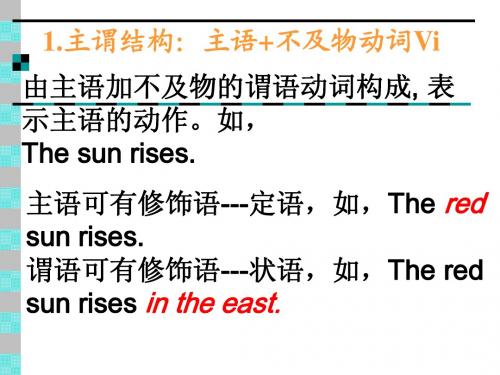
现在有 there is/are … 过去有 there was/were… 将来有 there will be… there is /are going to be... 现在已经有 there has/have there might be... 可能有 been… there must be … 肯定有 there must have been...
2. 而含有介词 at, for, from, into, of, with, to 等的动介词组不可拆分。如,look after(照顾), look at(瞧), look for (寻找), belong to(属于), refer to (参考,提及), think of(考虑,评 价), send for(派人去请), care for(喜 欢),suffer from(受…之苦), deal with(对付,应付), object to(反对), pay for(付…的钱),等。即我们只能说think of it,不能说think it of.
1. 1.
4. 双宾语结构
主语+及物谓语动词 间接宾语 主语 及物谓语动词+间接宾语(人)+ 及物谓语动词 间接宾语( 直接宾语(事物) 如, 直接宾语(事物) He brings me cookies every day She made me a beautiful dress. 若要先说直接宾语(事物),后说间接 宾语(人),则要借助介词to或for,如: He brings cookies to me every day. She made a beautiful dress for me.
I’d like you to meet my parents. Inf (不定式 不定式) 不定式 You try to get the other person down on the floor. adv. He named the country “Ao-tea-ma” n.
五种基本句型(含练习和答案)

. .五种基本句型,似千乎,有简有繁句子是由主语、谓语动词、表语、宾语、宾语补足语等组成的。
英语句子有长有短大、组合、变万化,难以捉摸,但其实只有五种基本句型。
所有英语句子都可以看成是这五种基本句型的扩省略或倒装。
因此掌握这五大句型,是掌握其他各种英语句子结构的基础。
英语句子依其组合方式可分为以下五种基本句型,句子成分的表示法为:S:Subject (主语) , V:Verb(动词),O: Object (宾语), IO : Indirect Object ( 间接宾语), DO: Direct Object ( 直接宾语) , P :Predicative (表语), OC :Object Complement (宾语补足语)。
五种基本句型见下表(S=主,V=谓, O=宾, P=表, IO=间宾,DO=直宾,OC=宾补):种类句型例句第 1 种S+V We work. ( 不及物)第 2 种S+V+O He plays ( 及物 ) the piano.第 3 种S+V+P We are( 系动词 ) students.第 4 种S+V+IO+DO She gave( 及物 ) me a pen.第 5 种S+V+O+OC He made(及物 ) the boy laugh.一、第 1 种句型:S+V(主语 +不及物动词)1、 Birds fly. 鸟飞。
主语+谓语(不及物动词)2、 He runs in the park. 他在公园里跑。
主语+谓语+地点状语( 不及物动词)此句型是“主语+不及物动词”构成句子的主体部分。
因为是不及物动词,后面当然不能带宾语了,但是可以有状语来修饰。
例如上面例句中的in the park 就是地点状语。
了3、Class begins. (begin 在句中是不及物动词)上课比较: We begin our class at eight. 我们八点钟开始上课。
(完整版)英语五大基本句型及练习
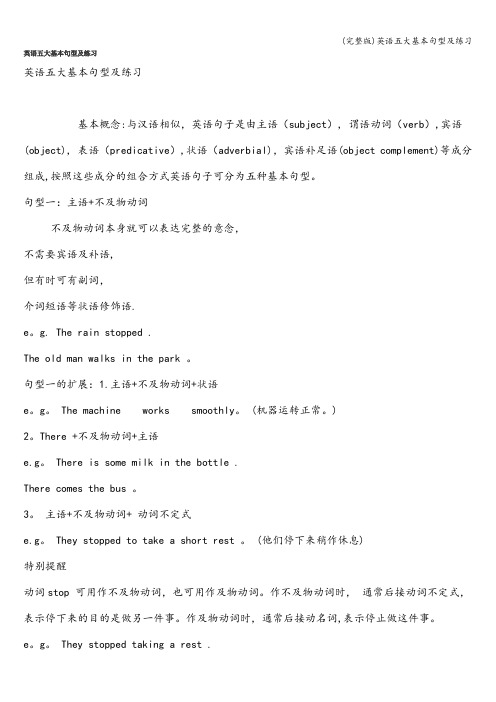
英语五大基本句型及练习英语五大基本句型及练习基本概念:与汉语相似,英语句子是由主语(subject), 谓语动词(verb),宾语(object), 表语(predicative),状语(adverbial),宾语补足语(object complement)等成分组成,按照这些成分的组合方式英语句子可分为五种基本句型。
句型一:主语+不及物动词不及物动词本身就可以表达完整的意念,不需要宾语及补语,但有时可有副词,介词短语等状语修饰语.e。
g. The rain stopped .The old man walks in the park 。
句型一的扩展:1.主语+不及物动词+状语e。
g。
The machine works smoothly。
(机器运转正常。
)2。
There +不及物动词+主语e.g。
There is some milk in the bottle .There comes the bus 。
3。
主语+不及物动词+ 动词不定式e.g。
They stopped to take a short rest 。
(他们停下来稍作休息)特别提醒动词stop 可用作不及物动词,也可用作及物动词。
作不及物动词时,通常后接动词不定式,表示停下来的目的是做另一件事。
作及物动词时,通常后接动名词,表示停止做这件事。
e。
g。
They stopped taking a rest .句型二:主语+系动词+表语系动词本身不能表达完整的意念没,需要形容词,名词,介词短语等来补充说明主语,也叫主语补语.e.g. My sister is a nurse .I feel quite hungry .The ball is under the desk .句型三:主语+及物动词+宾语及物动词本身需要一个动作的接受者(宾语),才可以表达一个完整的意念.e.g。
We are learning English 。
(完整版)英语五种基本句型及练习
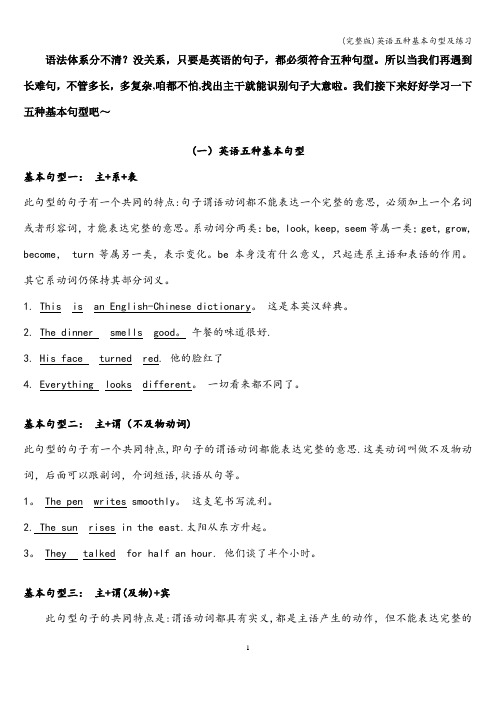
语法体系分不清?没关系,只要是英语的句子,都必须符合五种句型。
所以当我们再遇到长难句,不管多长,多复杂,咱都不怕,找出主干就能识别句子大意啦。
我们接下来好好学习一下五种基本句型吧~(一)英语五种基本句型基本句型一:主+系+表此句型的句子有一个共同的特点:句子谓语动词都不能表达一个完整的意思,必须加上一个名词或者形容词,才能表达完整的意思。
系动词分两类:be, look, keep, seem等属一类;get, grow, become, turn等属另一类,表示变化。
be 本身没有什么意义,只起连系主语和表语的作用。
其它系动词仍保持其部分词义。
1. This is an English-Chinese dictionary。
这是本英汉辞典。
2. The dinner smells good。
午餐的味道很好.3. His face turned red. 他的脸红了4. Everything looks different。
一切看来都不同了。
基本句型二:主+谓(不及物动词)此句型的句子有一个共同特点,即句子的谓语动词都能表达完整的意思.这类动词叫做不及物动词,后面可以跟副词,介词短语,状语从句等。
1。
The pen writes smoothly。
这支笔书写流利。
2. The sun rises in the east.太阳从东方升起。
3。
They talked for half an hour. 他们谈了半个小时。
基本句型三:主+谓(及物)+宾此句型句子的共同特点是:谓语动词都具有实义,都是主语产生的动作,但不能表达完整的意思,必须跟有一个宾语,即动作的承受者,才能使意思完整。
这类动词叫做及物动词。
1。
Who knows the answer?谁知道答案?2. He enjoys reading。
他喜欢看书.3。
My sister is writing a letter at this moment。
(完整word版)英语五大基本句型及练习
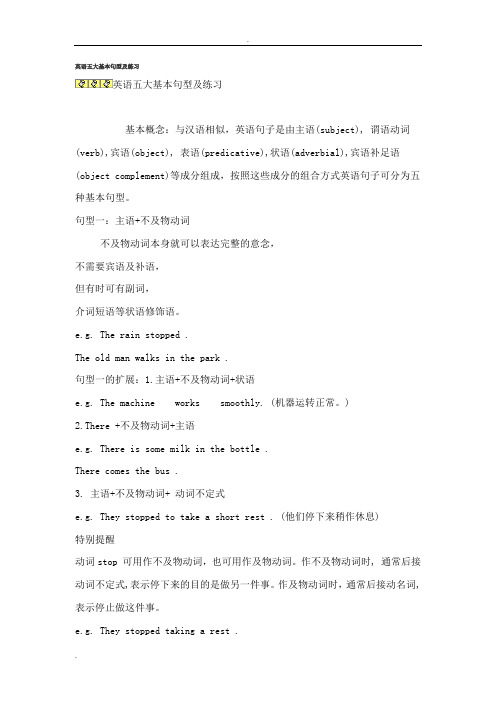
英语五大基本句型及练习英语五大基本句型及练习基本概念:与汉语相似,英语句子是由主语(subject), 谓语动词(verb),宾语(object), 表语(predicative),状语(adverbial),宾语补足语(object complement)等成分组成,按照这些成分的组合方式英语句子可分为五种基本句型。
句型一:主语+不及物动词不及物动词本身就可以表达完整的意念,不需要宾语及补语,但有时可有副词,介词短语等状语修饰语。
e.g. The rain stopped .The old man walks in the park .句型一的扩展:1.主语+不及物动词+状语e.g. The machine works smoothly. (机器运转正常。
)2.There +不及物动词+主语e.g. There is some milk in the bottle .There comes the bus .3. 主语+不及物动词+ 动词不定式e.g. They stopped to take a short rest . (他们停下来稍作休息)特别提醒动词stop 可用作不及物动词,也可用作及物动词。
作不及物动词时, 通常后接动词不定式,表示停下来的目的是做另一件事。
作及物动词时,通常后接动名词,表示停止做这件事。
e.g. They stopped taking a rest .句型二:主语+系动词+表语系动词本身不能表达完整的意念没,需要形容词,名词,介词短语等来补充说明主语,也叫主语补语。
e.g. My sister is a nurse .I feel quite hungry .The ball is under the desk .句型三:主语+及物动词+宾语及物动词本身需要一个动作的接受者(宾语),才可以表达一个完整的意念。
e.g. We are learning English .Do you know him ?Your radio needs repairing .She hopes to see her uncle.句型四:主语+及物动词+间接宾语+直接宾语有些及物动词需要两个宾语才能表达一个完整意念。
英语五大基本句型及练习
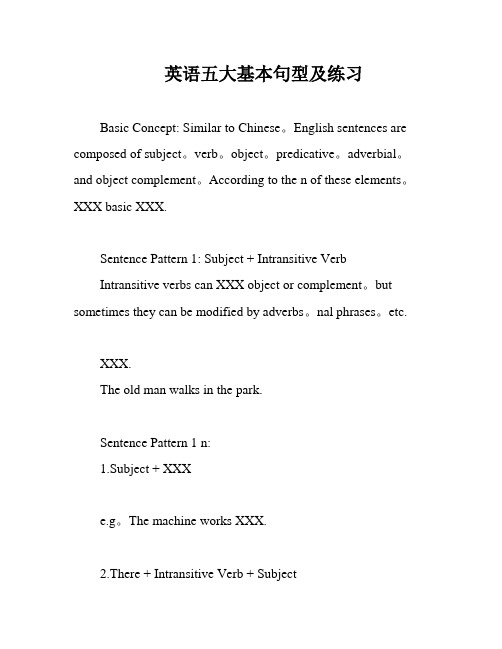
英语五大基本句型及练习Basic Concept: Similar to Chinese。
English sentences are composed of subject。
verb。
object。
predicative。
adverbial。
and object complement。
According to the n of these elements。
XXX basic XXX.Sentence Pattern 1: Subject + Intransitive VerbIntransitive verbs can XXX object or complement。
but sometimes they can be modified by adverbs。
nal phrases。
etc.XXX.The old man walks in the park.Sentence Pattern 1 n:1.Subject + XXXe.g。
The machine works XXX.2.There + Intransitive Verb + Subjecte.g。
There is some milk in the bottle.There comes the bus.3.Subject + Intransitive Verb + Infinitivee.g。
They ped to take a short rest.Note:The verb "" can be used as an XXX intransitive verb。
it is usually followed by an infinitive to indicate the purpose of ping to do something else。
When used as a transitive verb。
it is usually followed by a gerund to XXX.XXX.Sentence Pattern 2: Subject + Linking Verb + PredicativeLinking verbs cannot XXX adjectives。
(完整版)英语五大基本句型详解及练习(配答案)
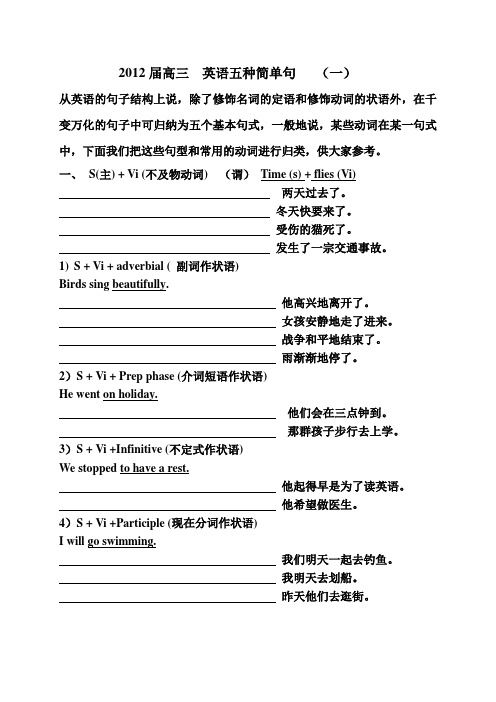
从英语的句子结构上说,除了修饰名词的定语和修饰动词的状语外,在千变万化的句子中可归纳为五个基本句式,一般地说,某些动词在某一句式中,下面我们把这些句型和常用的动词进行归类,供大家参考。
一、S(主) + Vi (不及物动词) (谓)Time (s) + flies (Vi)两天过去了。
冬天快要来了。
受伤的猫死了。
发生了一宗交通事故。
1)S + Vi + adverbial ( 副词作状语)Birds sing beautifully.他高兴地离开了。
女孩安静地走了进来。
战争和平地结束了。
雨渐渐地停了。
2)S + Vi + Prep phase (介词短语作状语)He went on holiday.他们会在三点钟到。
那群孩子步行去上学。
3)S + Vi +Infinitive (不定式作状语)We stopped to have a rest.他起得早是为了读英语。
他希望做医生。
4)S + Vi +Participle (现在分词作状语)I will go swimming.我们明天一起去钓鱼。
我明天去划船。
昨天他们去逛街。
S(主)+ Vt( 及物动词) (谓)+ Object (宾)------- We like English.1)S + Vt + N/ Pron (名词或代词作宾语)I like music. / I like her.他去年教数学。
我们已收到了他们的来信。
2)S + Vt + Infinitive (不定式作宾语)I want to help him.他爸爸期待拥有一家工厂。
他们假装在看书。
我尝试去解决那个问题。
常用于这个句型的动词有:attempt ,dare ,decide, desire, expect, hope, wish, intend, learn, need, offer, pretend, promise, propose, refuse, want, manage, plan, fail, try, agree等。
英语简单句的五种基本句型

I want to talk with this you 3.这本书他读过多次了 afternoon. He has read this many book times. 4.他们成功地完成了计划。
5.They kept their marriage a secret. 主谓双宾 6.He played dead. 主谓 7.She was nicknamed “Little Rabbit”. 主谓宾 8.Show me what you bought. 主谓 双宾 9.She never doubted that she 主谓宾 was right. 10.Good food keeps you 主谓宾宾补 healthy.
They have carried out the successfull plan 5.那位先生能流利地说三种语言。 y.
That gentleman can speak three languages fluentl y.
4
英语的基本句型
高三英语组
练习:判断下面的句子是哪种句型
1. Your sister dances beautifully. 主谓 2. They proved that the earth 主谓宾 was round. 3. This food looks inviting. 主系表 4. Doing that would be playing with fire. 主谓宾
- 1、下载文档前请自行甄别文档内容的完整性,平台不提供额外的编辑、内容补充、找答案等附加服务。
- 2、"仅部分预览"的文档,不可在线预览部分如存在完整性等问题,可反馈申请退款(可完整预览的文档不适用该条件!)。
- 3、如文档侵犯您的权益,请联系客服反馈,我们会尽快为您处理(人工客服工作时间:9:00-18:30)。
英语五大基本句型练习1. --- Oh, dear. I forgot the air tickets.--- You ______ something.A. have leftB. are always leavingC. are leavingD. always left2. --- I ______ so busily recently that I ______ no time to help you with your math.--- That’s OK. I can manage it by myself.A. have been working; haveB. have worked; hadC. am working; will haveD. had been working; had had3. Remember to send me a photo of us next time you ______ to me.A. are writingB. will writeC. has writtenD. write4. He ______ at the meeting, but his heart attack prevented him.A. will speakB. is going to speakC. had to speakD. was going to speak5. --- I beg your pardon, but I didn’t quite catch you.--- Oh, I ______ myself.A. am talking toB. talked aboutC. have talked toD. was talking to6. I ______ ping-pong quite well, but I haven’t had ti me to play since the New Year.A. will playB. have playedC. playedD. play7. I first met Tom 10 years ago. He ______ in a radio factory at that time.A. had workedB. has workedC. was workingD. has been working8. --- What ______ when I phoned you?--- I ______ my work, and I wanted to go out.A. have you done; finishedB. were you doing; have finishedC. did you do; had just finishedD. were you doing; had just finished9. --- Have you finished the report?--- No. I ______ it all this week.A. will doB. had doneC. have doneD. have been doing10. I can guess you were in a hurry. You ______ your sweater inside out.A. had wornB. woreC. were wearingD. are wearing11. --- We ______ that you would fix the TV set this week.--- I’m sorry. I ______ to fix it this week, but I’ve been too busy.A. had expected; had intendedB. are expecting; had intendedC. expect; intendD. expected; intend12. --- Why? Tom, your shirt is so dirty!--- Mum, I ______ my storeroom downstairs.A. cleanedB. have cleanedC. was cleaningD. have been cleaning13. They won’t buy new clothes because they ______ money to buy a new house.A. saveB. are savingC. have savedD. were saving14. The traffic in our city is already good and it ______ even better.A. getsB. gotC. has gotD. is getting15. --- I will come to attend your lecture at 10:00 tomorrow.--- I’m sorry, by then my lecture will have ended and I ______ my guests in my office.A. is being metB. will meetC. will be meetingD. will have met16. --- Alice came back home the day before yesterday.--- Really? Where ______?A. has she beenB. had she beenC. has she goneD. had she gone17. I know Mr. Brown; we ______ to each other at an international conference.A. are introducedB. are been introducedC. were introducedD. had been introduced18. --- Where do you think ______ he ______ the computer?--- Sorry. I have no idea.A. has; boughtB. 不填; boughtC. did; buyD. 不填; buys19. Don’t bother to look for my dict ionary --- it ______ some day.A. turns upB. has turned upC. will turn upD. is going to turn up20. --- What do you think of this kind of TV set, which ______ in Shanghai?--- Well, I don’t care abo ut such things.A. was madeB. is madeC. has been madeD. had been made21. --- Did he notice you enter the room?--- I don’t think so. He ______ to the radio with his eyes shut.A. listenedB. was listeningC. has listenedD. had listened22. The plane ______ at 7:00 pm, so I have to be at the airport by 6:40 at the latest.A. has leftB. would leaveC. will have leftD. leaves23. The train ______ at the present speed until it reaches the foot of the mountain at ab out nine o’clock tonight.A. wentB. is goingC. goesD. will be going24. I used to drink a lot of tea but these days I ______ coffee.A. preferB. preferredC. had preferredD. am preferring25. The vegetables didn’t taste very good. They ______ too long.A. had been cookedB. were cookedC. have cookedD. cooked26. --- Remember the first time we met, Jim?--- Of course I do. You ______ in the library.A. were readingB. had readC. have readD. read27. I want to buy that kind of cloth because I ______ the cloth ______ well.A. have told; washesB. have been told; washesC. was told; washedD. have been told; is washed28. --- Is Tom still smoking?--- No. By next Saturday he ______ for a whole month without smoking a single cigarette.A. will beB. will have goneC. will have beenD. has been going29. --- ______ Betty this morning?--- Not yet, but she is sure to be here before noon.A. Have you seenB. Will you seeC. Do you seeD. Did you see?30. Jim talked for about half an hour yesterday. Never ______ him talk so much.A. I heardB. did I hearC. I had heardD. had I heard31. --- Look at the black clouds. It ______ soon.--- Sure. If only we ______ out.A. is raining; didn’t comeB. is to rain; won’t startC. will rain; haven’t startedD. is going to rain; hadn’t come32. He ______ articles for our wall-newspaper these three years, and he ______ about forty articles.A. has been writing; has writtenB. has been writing; wroteC. is writing; has been writingD. has written; has written33. She ______ to the office than she got down to writing the report.A. has no sooner gotB. had hardly gotC. no sooner gotD. had no sooner got34. When he was alive, the old scientist used to say that knowledge ______ from practice and he gained his experience by doing a lot of practical work.A. was comingB. had comeC. comesD. would come35. --- Don’t forget to bring my new books tomorrow afternoon.--- No, I ______.A. don’tB. doC. won’tD. will36. I decided to go to the library as soon as I ______.A. finished what I was doingB. finished what I didC. would finish what I was doingD. finish what I did37. You won’t know whether the coat fi ts you until you ______ it on.A. will tryB. have triedC. triedD. are trying38. My dictionary ______. I have looked for it everywhere but still ______it.A. has lost; don’t findB. is missing; don’t findC. has lost; haven’t foundD. is missing; haven’t found39. ______ it with me and I’ll see what I can do.A. When leftB. LeavingC. If you leaveD. Leave40. --- How are you planning to travel to Shanghai?--- I ______ yet, but I ______ taking a train.A. didn’t decide; am consideringB. ha ven’t decided; considerC. h aven’t decided; am consideringD. h adn’t decided; have considered41. --- Excuse me, sir. Would you do me a favour?--- Of course. What is it?--- I ______ if you could take me to the station.A. would wonderB. did wonderC. was wonderingD. had wondered42. --- Got your driving license?--- No. I ______ too busy to have enough practice, so I didn’t take the driving test last week. I’m going to next week.A. wasB. have beenC. amD. had been43. With the development of science, more new technology ______ to the field of IT.A. has introducedB. is being introducedC. is introducedD. was introduced44. --- Who’s the man over there?--- It’s Jack.--- Oh? ______ in Italy.A. I think he’sB. I’ve thought he’s beenC. I thought he wasD. I’d thought he’d been45. --- I dropped in at your house at about ten l ast night, but you weren’t in.--- I ______ regular exercises at the club.A. didB. was doingC. had doneD. have been doing46. --- Each of the students, working hard at their lessons, ______ the book.--- So have I.A. is readingB. has readC. readingD. reads47. The baby is generally healthy, but every now and then he ______ a cold.A. has caughtB. is catchingC. will catchD. does catch48. It is when the plane ______ that you’d better f ind out at the booking office.A. would take offB. had taken offC. was taking offD. is taking off49. --- I’m sorry, but there’s no smoking on this flight.--- Oh, I ______ that. Sorry, I won’t again.A. d on’t knowB. didn’t knowC. won’t knowD. haven’t known50. I thought Jim would say something about his school report, but he ______ it.A. doesn’t mentionB. hadn’t mentionedC. didn’t mentionD. hasn’t mentioned各省时态高考题1、(全国卷I)2l. The house belongs to my aunt but she______ here any more.A. hasn't livedB. didn't liveC. hadn't livedD. doesn't live2、(全国卷I)31. Eliza remembers everything exactly as if it ______ yesterday.A. was happeningB. happensC. has happenedD. happened3、(全国卷2)12. John, a friend of mine, who got married only last week, spent $3,000 more than he _______ for the wedding.A. will planB. has plannedC. would planD. had planned4、(北京卷)27. --- _______ leave at the end of this month.--- I don’t think you should do that until ________ another job.A. I’m going to; you’d foundB. I’m going to; you’ve foundC. I’ll; you’ll findD. I’ll; you’d find5、(北京卷)30. --- Your job ________ open for your return. --- Thanks.A. will be keptB. will keepC. had keptD. had been kept6、(北京卷)32. --- Where did you put the car keys?--- Oh, I ________ I put them on the chair because the phone rang as I ______ in.A. remembered ; comeB. remembered ; was comingC. remember ; comeD. remember ; was coming7、(上海春)28. We ___ our new neighbors yet, so we don't know their names.A. don't meetB. won't meetC. haven't metD. hadn't met8、(天津卷)3.-Did Linda see the traffic accident? (时态+倒装)-No, no sooner than it happened.A. had she goneB. she had goneC. has she goneD. she has gone9、(天津卷)4. What we used to think impossible now does seem possible.A. isB. wasC. has beenD. will be10. (重庆卷)21.I have to go to work by taxi because my car _______ at the garage.A. will be repairedB. is repairedC. is being repairedD. has been repaired11、(重庆卷)30.Customers are asked to make sure that they _______ the right change before leaving the shop. (时态+语态)A. will giveB. have been givenC. have givenD. will be given12、(重庆卷)31.I _______in London for many years,but I’ve never regretted my final decision to move back to China.A. livedB. was livingC. have livedD. had lived13、(辽宁卷)27.The father as well as his three children skating on the frozen river every Sunday afternoon in winter.A. is goingB. goC. goesD. are going14、(辽宁卷)29.I think it is necessary for my 19-year-old son to have his own mobile phone, for I sometimes want to make sure if he home for dinner.A. comeB. comesC. has comeD. will come15、(辽宁卷)31.It is said that the early European playing-cards for entertainment and education.A. were being designedB. have designedC. have been designedD. were designed16、(四川卷)22. Look at the timetable. Hurry up! Flight 4026 ______ off at 18:20.A. takesB. tookC. will be takenD. has taken17、(江西卷)21.My cousin went to Canada two yours ago.He ________ there for a few months and then went to America.A.worked B.would work C.would be working D. has been working18、(陕西卷)7. —You look very tired. _______ at all last night?—No, not really. I’m tired out now.A. Do you sleepB. Were you sleepingC. Did you sleepD. Had you slept19、(陕西卷)12.The construction of the two new railway lines ________ by now. (+主谓一致)A. has been completedB. have completedC. has completedD. have been completed20、(陕西卷)16.Only then ___________ how much damage had been caused. (+倒装)A. she realizedB. she had realizedC. had she realizedD. did she realize21、(福建卷)dies and gentlemen, please fasten your seat belts. The plane________.A. takes offB. is taking offC. has taken offD. took off22、(福建卷)31.The moment the 28th Olympic Games _______ open, the whole world cheered.A. declaredB. have been declaredC. have declaredD. were declared23、(福建卷)32.The workers will go on strike if the demands they _______ put forward are turned down.(+情态动词)A. could B would C.不填D. had24、(湖北卷)32. I won't tell the student the answer to the math problem until he ____on it for more than an hour.A. has been workingB. will have workedC. will have been workingD. had worked25、(湖南卷)24.I was giving a talk to a large group of people, the same talk I ________to half a dozen other groups.A. was givingB. am givingC. had givenD. have given26、(湖南卷)35.In a room above the store, where a party __________, some workers were busily setting the table.A. was to be heldB. has been heldC. will be heldD. is being held27、(江苏卷)23. --- I don’t suppose the police know who did it.--- Well, surprisingly they do. A man has been arrested and ________ now.A. has been questionedB. is being questionedC. is questioningD. has questioned28、(江苏卷)27. Although medical science __________ control over several dangerous diseases, what worries us is that some of them are returning.A. achievedB. has achievedC. will achieveD. had achieved29、(广东卷)32. The young girl sitting next to me on the plane was very nervous. She_________ before.A. hasn't flownB. didn't flyC. hadn't flownD. wasn't flying30、(广东卷)33. So difficult it to work out the problem that I decided to ask Tom for advice.(+倒装)A. I did findB. did I findC. I have foundD. have I found31、(浙江卷)6. This machine _______. It hasn’t worked for years.A. didn’t workB. wasn’t workingC. doesn’t workD. isn’t working32、(浙江卷)7. The company had about 20 notebook computers but only one-third _______ used regularly. Now we have 60 working all day long. (+主谓一致)A. isB. areC. wasD. were33、(浙江卷)16. My friend, who ______ on the International Olympic Committee all his life, is retiring next month.A. servedB. is servingC. had servedD. has served34、(安徽省)25.I along the street looking for a place to park when the accident .A.went; was occurring B.went; occurredC.was going; occurred D.was going; had occurred35、(全国卷I)29. The water ______ cool when I joined into the pool for morning exercise.A. was feltB. is feltC. feltD. feels (+动词区别)36.(山东卷)28. Although the causes of cancer ____, we do not yet have any practical way to prevent it.A. are being uncoveredB. have been uncoveringC. are uncoveringD. have uncovered一、指出下列句子划线部分是什么句子成分:1. The students got on the school bus.2. He handed me the newspaper.3. I shall answer your question after class.4. What a beautiful Chinese painting!5. They went hunting together early in the morning.6. His job is to train swimmers.7. He took many photos of the palaces in Beijing.8. There is going to be an American film tonight.9. He is to leave for Shanghai tomorrow.10. His wish is to become a scientist.11. He managed to finish the work in time.12. Tom came to ask me for advice.13. He found it important to master English.14. Do you have anything else to say?15. To be honest; your pronunciation is not so good.16. Would you please tell me your address?17. He sat there, reading a newspaper.18. It is our duty to keep our classroom clean and tidy.19. He noticed a man enter the room.20. The apples tasted sweet.。
